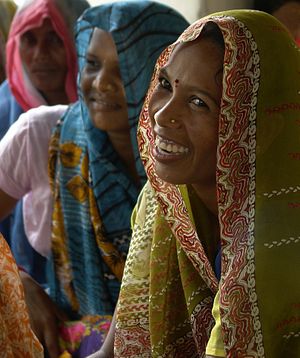The image of two teen girls and their lynched bodies hanging off tree in a remote village in the western Uttar Pradesh has disturbed India for days. The image shames the whole nation and raises a deep question mark over Indian society and its practices. One dreads to read the newspaper again lest the image reappear.
How can a civilized society treat its own women like this ?
It really is baffling that even at this stage in history we nurture so much prejudice against women in India. It is also disturbing that the young generation in India’s villages are so violent and medieval in their mindset. How can we trust the judgement of such a generation and leave the levers of power in their hands?
What was, after all, the fault of the girls who were hanged?
They were attacked as they were relieving themselves in the fields, which is the norm in most of the villages in the country. Their attackers abducted, gang raped and later on hanged them. The incident took place in Katra village of Badaun district in Uttar Pradesh, just 200 kilometers outside Delhi. The girls, aged 12 and 15, were cousins.
Such acts of cruelty put the practices of the radical Nigerian Islamic group Boko Haram to shame. Even the Taliban would feel emboldened and more humane after seeing these incidents in India.
Medievalism in modern India keeps on asserting itself time and time again, thereby shaming the nation.
The girls in question belonged to the Dalit community, a marginalized section of Hindu society. Historically, Dalits have been socially and economically very backward. Most of the community members work as part-time tillers in the field or take up part-time labor to earn a living. Most of them are so poor that they cannot afford a functioning toilet at home and rely on nearby fields to relieve themselves.
In the past two decades, a concerted effort was made to uplift them. The Dalit communities’ political profile has also gone up with the Bahujan Samaj Party (BSP) in Uttar Pradesh. Their rising profile and gradual mobility has not gone down well with many in India’s upper caste communities, who find it difficult to accept them as equal.
The violence against women in many parts of the country is a result of this sort of social conflict .
Pratiksha Baxi in Indian Express writes that “rape is an instrument to stifle, deny and prevent gender-based equality. It is used to quell dissent or social movements, deter social mobility, maintain social hierarchy, restrict access to public spaces, deny safety at home, create unsafe work environments, punish the incarcerated and destroy the sexual or reproductive futures of hated communities. It is used to produce sexual humiliation, which is necessary for the reproduction of the patriarchal social order.”
Among the accused in the rape and murder case in Badaun are two policemen who did not act in time to save the lives of the victims. Part of problem in parts of India is the application and enforcement of the law to punish the culprits. After the December 16, 2012 gang rape case in Delhi the Indian government enacted a very strict law on crimes against women. This has not deterred people from committing violence against women. In most cases, police act with complete insensitivity making women suffer a second time with their apathy and tendency to abuse power. Despite the complaints from the parents of the girls, the police took their time in acting and arresting the culprits thereby heaping double insult not only on the victims but on the families also.
What is most galling is the attitude of Indian society towards its women. Discrimination against girls starts at home. In a majority of households boys are given preferential treatment in terms of education, facilities, and mobility. Very few girls gain the liberty to plan their own life. Their activities are controlled. This discrimination within the family breeds violence across society against women. Any violation of social norms is treated with contempt.
That’s why there are so many instances of honor killing across India. The patriarchal society creates hurdles at every stage for women’s growth and liberation. When women try to assert themselves or free themselves of the patriarchy, the male-dominated society reacts violently.
In the past couple of decades, education has enhanced the mobility and visibility of women in Indian society. But it’s just a small development. The emancipation of women from tradition and patriarchy is a long-time struggle. India has been witnessing a continuous struggle by women’s rights groups to break the barrier of tradition and create awareness about the rights of women in the country. Things are slowly changing but there is still a long way to go.
The political class talks about women’s rights and liberties but never makes it a real priority. The ten point agenda that Narendra Modi’s government has set out does not include empowerment of women.
The incident in Badaun should shame the collective conscience of Indian society. It has lowered India’s image in the comity of nations.
Mere economic growth cannot assure the growth of the nation. For India to be considered truly developed, it has to treat its women with respect and dignity.

































